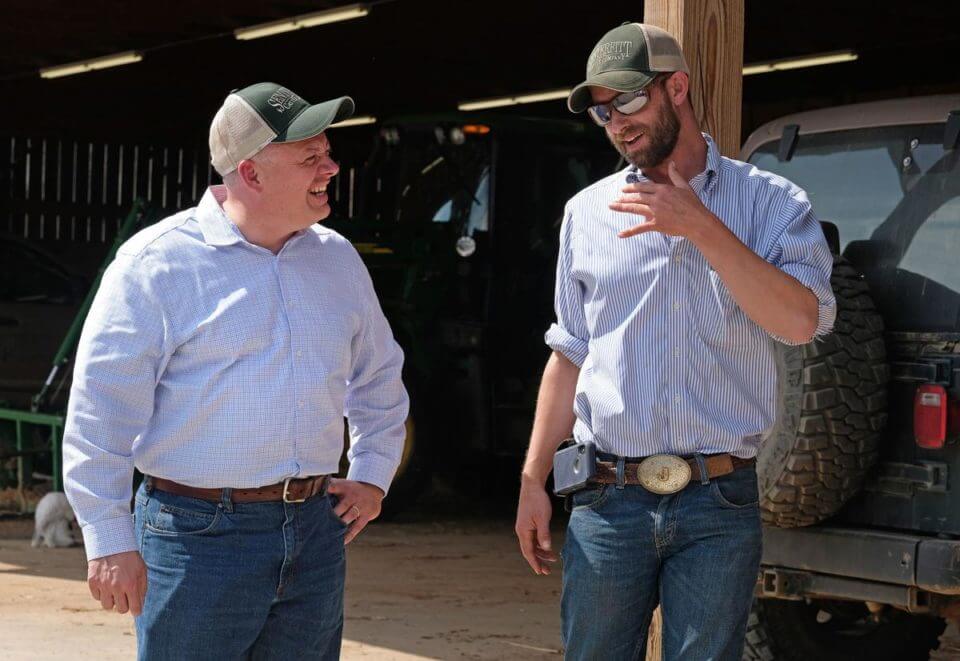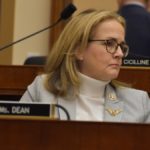
“I had an old chief master sergeant tell me that when you first enter a job, you should keep your mouth shut for three months…So I have a lot to learn.”
The 5th District of Virginia has a new representative: Republican Denver Riggleman. A former member of the United States Air Force and a local small business owner, Congressman Riggleman looks to fight back against government regulation in favor of transparency and private property rights for all citizens. He joins Merion West and Connor Mustakas to discuss issues facing his district, his stance on American-Israeli relations, and what his priorities are from his very first day in Congress.
Delving into your background, you pride yourself on being a local business owner from the 5th District. You have your own local distillery. Do you remember any specific moment in building and maintaining this company that made you decide to seek office?
The specific moment had to be the pile up of regulatory agencies and the weaponization of regulations against our company. That moment really broke down into two things that happened. Number one, no matter what I did to change laws that handle small business, I would never have lobbyists bigger than the ones fighting against me. The second was fighting for private property rights when they tried to run a pipeline through my property. [Through] fighting both obstacles, I realized I either had to run [for office] or I had to fight. I didn’t have any choice in the matter.
I had never been involved with politics before. It was really a combination of being hammered from both sides and realizing that I was powerless in my own life—and not understanding the extent politics controls your life. So it came down to that “I didn’t get involved with government; it got involved with me.” It was either fight or flight, and I decided to fight.
You have spoken out in support of the Private Property Rights Protection Act of 2017. Can you share more information on your stance on this piece of legislation?
Sure. What it comes down to is that you never know the issues until you know the issues. As a private business owner, I tried to start a manufacturing company at a time when there were massive amounts of infrastructure development being done from the government, through private property with use of eminent domain. Also, what I found out very quickly was a lot of that didn’t have to do with public use, but it was actually an abuse of eminent domain for private companies. It really opened my eyes to the fact that private property rights are one of the most important rights we have in the United States. I believe we can combine that infrastructure growth with the protection of private property rights. I don’t think it is an either-or-prospect or a zero-sum game.
I was very surprised that no one seemed willing to do that. It was either an “anti” or “pro” pipeline stance. I think we need to be for private property rights and ensure those liberties for people going forward, and that’s why I got involved.
And are there certain government regulations you find particularly problematic?
Oh my goodness, I don’t know how long you want to talk! I can tell you a lot of these issues started with labor in the 5th District. I am a strong pro-border security individual, but I also think we need to streamline immigration. We have internal labor issues that are pretty dire on the agricultural side. Talking to multiple farmers, mostly Republicans, they told me horror stories of regulatory overreach that leaves them screaming. It makes it difficult to get legal, migrant labor.
I can give you a couple of examples. First, it costs $75 per H-2A worker to drive on private property. That sounds incredible, but the Department of Labor creates a lot of these regulations. Second, there are redundant housing inspections for farmers with H-2A workers. Federal mandate is that they get inspected, but it’s by multiple agencies on the very same checklist. So they look at me with all these regulatory hurdles; this is on top of how hard it is even to get workers over here. Also, mandatory increase to the minimum wage of H-2A workers has [farmers] to the point where they say there are being overwhelmed. Our 5th district is bigger than the state of New Jersey, looks like a dragon riding a scooter, and has so many hurdles from a government that is making regulations it knows nothing about. The district is four hours north-to-south, and I hear these issues over and over throughout the district.
I am actually looking at a picture of your district right now, and it does actually look like a dragon riding a scooter.
It does! 21 counties. If you are looking at Fauquier County in the north, it has a median family income of $91,000. Whereas in Danville, you’re looking at $37,000. This presents a lot of challenges, and I think the solution boils down to this: Get government out of our way. Let us build solutions for our own lives. Government seems to create problems—and solutions that exacerbate them. It is pretty amazing that if you look at my whole district, that is the overriding theme. Get government out of the way and let’s get rid of this regulatory overreach that’s destroying small business.
Are government regulations the biggest issue facing your district? Or are there other issues that also stand out?
There are three major issues: healthcare, immigration, and taxes, in that order. All of those presented interesting solutions we have to solve. First, the government gets more involved with healthcare, and it’s broken. Whether it’s Democrats or Republicans, the more they have government involved with people paying for solutions, the worse it gets for the American taxpayer, employers, and employees.
On immigration, the 5th District wants a secure border. They also know that the immigration laws are broken, and Congress has not done anything about them. We have severe labor issues that need to be addressed, which can be dealt with through immigration reform.
With taxes, the tax cuts were a godsend for my district. Unemployment went down, 3% specifically in the 5th district. We had people say “Listen, look what happens when you have tax cuts, opportunity zones, and investments.” It also made them say: “Look how ridiculous it is when the government gets involved in healthcare or immigration.” So when you get the government out of the way, I think we will have a much better economy and a better common sense government.
Without getting too bogged down in the personal life of your predecessor, the former 5th District Representative Tom Garrett had some controversies in his past. When you were running did you feel as though you had to rebuild trust from constituents of the 5th government?
Well you know, Tom got out because of personal issues. For me, I just want everybody to know that I am going to run the most ethical office possible. It’s integrity-based, ethics-based, and I want to be completely transparent from the congressional office. I am the fifth congressmen [from this district] in 12 years. I think we need to bring stability to the 5th District, and I think we are going to do that with common sense policies. I think it really comes down to whether or not you agree with me being transparent and having ethics with everything I do.
The current state of Washington D.C. is more partisan than ever. When you look at the national scene you are about to enter, what are some of the positives and negatives you see? It is easy to point out the negatives, but do you see any positives of the political scene?
We are the biggest incoming class of freshman representatives since World War II. I just got back from a bipartisan trip with three Republicans and three Democrats from Israel. Looking back on that trip, if that is a microcosm of what bipartisanship can be, this could be successful. However, I just have a feeling, it is going be very partisan, given the party-politics dynamics. It is going to be a challenge for any new Republican coming in to be bipartisan, but I am going to try.
As long as it meets the balance of the Constitution, is liberty based, and meets the needs of the 5th District, I am happy to be bipartisan. But if it goes against the shared values of the 5th, I won’t be. It comes down to when bipartisanship helps the district, but I won’t be bipartisan for the sake of being bipartisan. However, I do like working with common sense people which we have on both sides of the aisle.
My next question actually was about Israel, which you brought up. On your website’s political platform you spoke about how an Air Force mission to Tel Aviv changed your stance on Israel. You also have come out in favor of President Trump’s decision to move the U.S. embassy to Jerusalem. Can you elaborate more on what you experienced in Israel and what you hope to see in the future of our countries relations together?
Israel really is the keystone of security for the Middle East and Europe. Being there in 1996 during the bus bombings and in 2018, I feel people don’t understand just how small Israel is and what the country has been going through. I was on the border in Gaza, the West Bank, and able to go into Ramallah to talk to the Palestinian National Authority. But when you see the flag of Hezbollah flying right near the border of Israel, you realize there is a right for Israel to exist that we need to protect. That’s just how I am. I am very pro-Israel, and I believe the Jewish state has a right to exist.
Lastly, how do you see your first months going and what is the first issue you hope to tackle when you enter office?
[When I was in the military], I had an old chief master sergeant tell me that when you first enter a job, you should keep your mouth shut for three months. What is that old saying, “Keep your mouth shut and be thoughtful, rather than be open and confirm it.” So I have a lot to learn, and I am always surprised when people come out as an expert of all subjects—or purport to know the keys to the kingdom and want to be Twitter kings or queens. I am going to focus on learning.
The first thing I want to tackle is transparency. Let’s make sure we keep the tax cuts in place and start to look for bipartisan solutions to healthcare and immigration. Those are my priorities.
Thank you for your time today.
Thank you, Connor.











